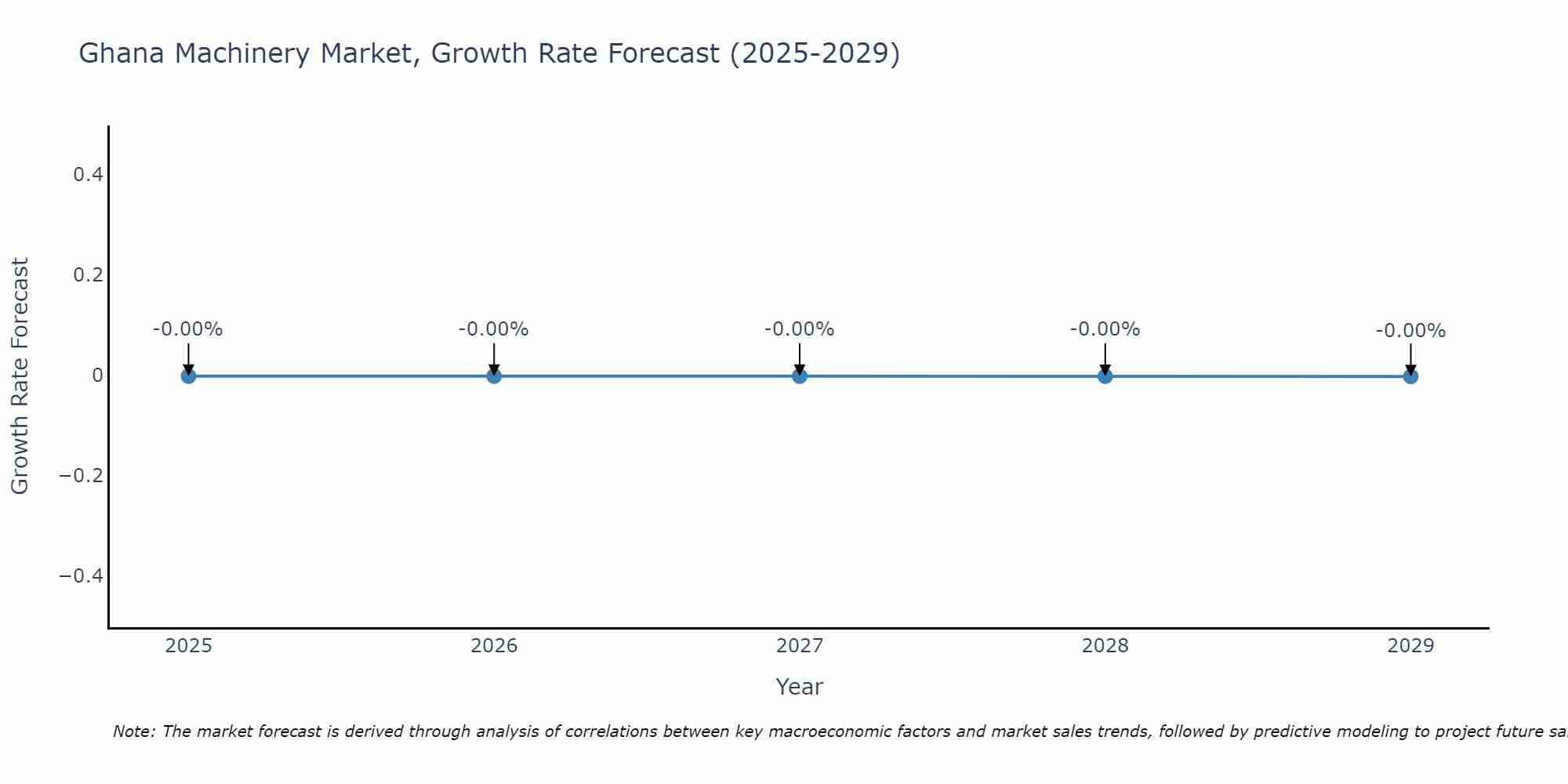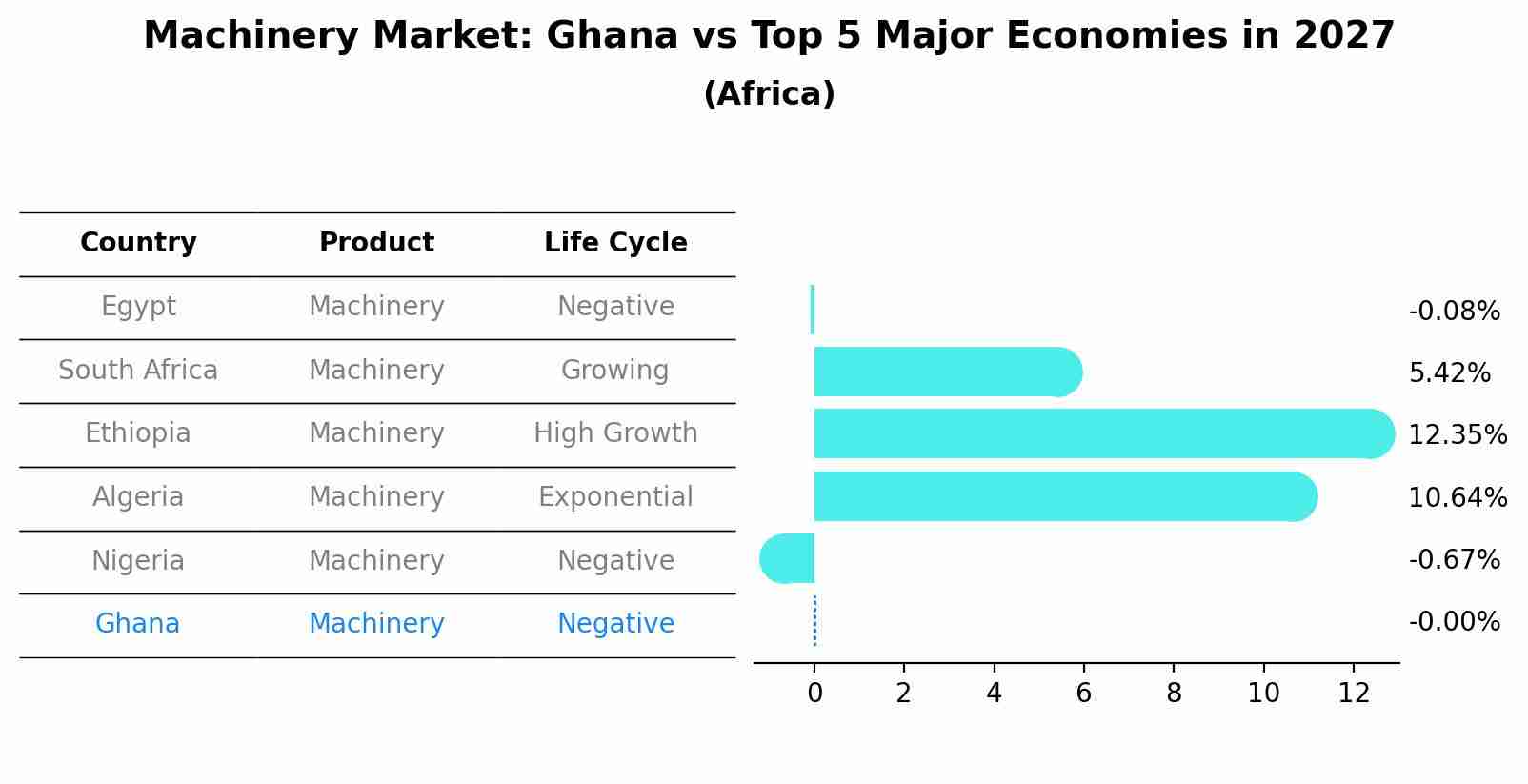Ghana Machinery Market (2025-2031) Outlook | Trends, Share, Analysis, Forecast, Companies, Growth, Size, Revenue, Industry & Value
| Product Code: ETC433192 | Publication Date: Oct 2022 | Updated Date: Jul 2025 | Product Type: Market Research Report | |
| Publisher: 6Wresearch | Author: Shubham Deep | No. of Pages: 75 | No. of Figures: 35 | No. of Tables: 20 |
Ghana Machinery Market Size Growth Rate
The Ghana Machinery Market could see a tapering of growth rates over 2025 to 2029. Starting high at -0.00% in 2025, the market steadily declines to -0.00% by 2029.

Machinery Market: Ghana vs Top 5 Major Economies in 2027 (Africa)
Ghana's Machinery market is anticipated to experience a negative growth rate of -0.00% by 2027, reflecting trends observed in the largest economy Egypt, followed by South Africa, Ethiopia, Algeria and Nigeria.

Ghana Machinery Market Synopsis
The machinery market in Ghana is experiencing steady growth driven by various sectors such as agriculture, construction, mining, and manufacturing. The demand for machinery in Ghana is increasing due to infrastructure development projects, expansion in the agricultural sector, and the growth of small and medium enterprises. Key machinery products in high demand include tractors, excavators, bulldozers, generators, and industrial machinery. The market is competitive, with both local and international manufacturers and suppliers vying for market share. However, challenges such as high import tariffs, limited access to financing, and inadequate infrastructure hinder the full potential of the machinery market in Ghana. Overall, the market presents opportunities for companies to capitalize on the country`s economic growth and increasing investment in key sectors.
Ghana Machinery Market Trends
In the Ghana Machinery Market, there is a noticeable trend towards the adoption of advanced technology and machinery to improve productivity and efficiency across various industries. There is a growing demand for machinery in sectors such as agriculture, construction, mining, and manufacturing as businesses seek to modernize their operations. Additionally, sustainability and environmental concerns are driving the market towards more eco-friendly and energy-efficient machinery solutions. The government`s initiatives to promote local manufacturing and industrial development are also influencing the market, leading to increased investments in machinery. Overall, the Ghana Machinery Market is experiencing a shift towards innovative and sustainable solutions to meet the evolving needs of businesses and industries in the country.
Ghana Machinery Market Challenges
The Ghana Machinery Market faces several challenges, including limited access to financing for buyers looking to invest in machinery, high import taxes and tariffs on machinery which increase the cost of acquisition, inadequate infrastructure and logistics which hinder the transportation and distribution of machinery, as well as a lack of skilled technicians and maintenance personnel to support the proper functioning of machinery. Additionally, the market is also impacted by the presence of counterfeit and substandard machinery products, leading to concerns about quality and reliability. Overall, these challenges can act as barriers to entry for both local and foreign machinery suppliers and hinder the growth and development of the machinery sector in Ghana.
Ghana Machinery Market Investment Opportunities
Investment opportunities in the Ghana Machinery Market include the growing demand for agricultural machinery due to the country`s reliance on the agricultural sector. Investors can consider opportunities in supplying tractors, irrigation equipment, and other farming machinery to support increased productivity and efficiency in the sector. Additionally, there is a rising need for construction machinery as Ghana continues to invest in infrastructure development projects such as roads, bridges, and housing. Investing in the machinery market in Ghana presents opportunities for partnerships with local distributors, manufacturers, or even setting up assembly plants to cater to the domestic market as well as neighboring countries in West Africa. Overall, the Ghana Machinery Market offers potential for growth and profitability for investors looking to capitalize on the country`s economic development and industrialization efforts.
Jordan Agar Market Government Policies
Government policies related to the Ghana Machinery Market include the implementation of import tariffs and duties to protect domestic industries, as well as regulations on quality standards to ensure the safety and efficiency of machinery used in various sectors. The government also provides incentives such as tax breaks and subsidies to promote local manufacturing and assembly of machinery. Additionally, there are initiatives to improve infrastructure and provide training programs to enhance the skills of workers in the machinery industry. Overall, the government aims to create a conducive environment for both local and foreign investors in the machinery market while prioritizing the development of domestic capabilities and ensuring compliance with international standards.
Ghana Machinery Market Future Outlook
The future outlook for the Ghana Machinery Market appears promising due to several factors. Economic growth and increasing urbanization in Ghana are driving demand for machinery across various sectors such as construction, agriculture, and manufacturing. The government`s focus on infrastructure development and industrialization initiatives is expected to further boost the market. Additionally, the adoption of advanced technologies and automation in industries is likely to drive the demand for modern machinery solutions. However, challenges such as access to financing, import duties, and competition from foreign manufacturers may impact the market growth. Overall, with the right policies and investments in place, the Ghana Machinery Market is anticipated to experience steady growth in the coming years.
Key Highlights of the Report:
- Ghana Machinery Market Outlook
- Market Size of Ghana Machinery Market, 2024
- Forecast of Ghana Machinery Market, 2031
- Historical Data and Forecast of Ghana Machinery Revenues & Volume for the Period 2021 - 2031
- Ghana Machinery Market Trend Evolution
- Ghana Machinery Market Drivers and Challenges
- Ghana Machinery Price Trends
- Ghana Machinery Porter's Five Forces
- Ghana Machinery Industry Life Cycle
- Historical Data and Forecast of Ghana Machinery Market Revenues & Volume By Type for the Period 2021 - 2031
- Historical Data and Forecast of Ghana Machinery Market Revenues & Volume By Agriculture, Construction, And Mining Machinery for the Period 2021 - 2031
- Historical Data and Forecast of Ghana Machinery Market Revenues & Volume By Industrial Machinery for the Period 2021 - 2031
- Historical Data and Forecast of Ghana Machinery Market Revenues & Volume By Commercial And Service Industry Machinery for the Period 2021 - 2031
- Historical Data and Forecast of Ghana Machinery Market Revenues & Volume By Ventilation for the Period 2021 - 2031
- Historical Data and Forecast of Ghana Machinery Market Revenues & Volume By Heating for the Period 2021 - 2031
- Historical Data and Forecast of Ghana Machinery Market Revenues & Volume By Air-Conditioning for the Period 2021 - 2031
- Historical Data and Forecast of Ghana Machinery Market Revenues & Volume By Commercial Refrigeration Equipment for the Period 2021 - 2031
- Historical Data and Forecast of Ghana Machinery Market Revenues & Volume By Distribution Channel for the Period 2021 - 2031
- Historical Data and Forecast of Ghana Machinery Market Revenues & Volume By Supermarkets/Hypermarkets for the Period 2021 - 2031
- Historical Data and Forecast of Ghana Machinery Market Revenues & Volume By Convenience Stores for the Period 2021 - 2031
- Historical Data and Forecast of Ghana Machinery Market Revenues & Volume By E-Commerce for the Period 2021 - 2031
- Historical Data and Forecast of Ghana Machinery Market Revenues & Volume By Others for the Period 2021 - 2031
- Historical Data and Forecast of Ghana Machinery Market Revenues & Volume By Others for the Period 2021 - 2031
- Historical Data and Forecast of Ghana Machinery Market Revenues & Volume By Nature for the Period 2021 - 2031
- Historical Data and Forecast of Ghana Machinery Market Revenues & Volume By Organic for the Period 2021 - 2031
- Historical Data and Forecast of Ghana Machinery Market Revenues & Volume By Conventional for the Period 2021 - 2031
- Ghana Machinery Import Export Trade Statistics
- Market Opportunity Assessment By Type
- Market Opportunity Assessment By Distribution Channel
- Market Opportunity Assessment By Nature
- Ghana Machinery Top Companies Market Share
- Ghana Machinery Competitive Benchmarking By Technical and Operational Parameters
- Ghana Machinery Company Profiles
- Ghana Machinery Key Strategic Recommendations
Frequently Asked Questions About the Market Study (FAQs):
Export potential assessment - trade Analytics for 2030
Export potential enables firms to identify high-growth global markets with greater confidence by combining advanced trade intelligence with a structured quantitative methodology. The framework analyzes emerging demand trends and country-level import patterns while integrating macroeconomic and trade datasets such as GDP and population forecasts, bilateral import–export flows, tariff structures, elasticity differentials between developed and developing economies, geographic distance, and import demand projections. Using weighted trade values from 2020–2024 as the base period to project country-to-country export potential for 2030, these inputs are operationalized through calculated drivers such as gravity model parameters, tariff impact factors, and projected GDP per-capita growth. Through an analysis of hidden potentials, demand hotspots, and market conditions that are most favorable to success, this method enables firms to focus on target countries, maximize returns, and global expansion with data, backed by accuracy.
By factoring in the projected importer demand gap that is currently unmet and could be potential opportunity, it identifies the potential for the Exporter (Country) among 190 countries, against the general trade analysis, which identifies the biggest importer or exporter.
To discover high-growth global markets and optimize your business strategy:
Click Here- Single User License$ 1,995
- Department License$ 2,400
- Site License$ 3,120
- Global License$ 3,795
Search
Thought Leadership and Analyst Meet
Our Clients
Related Reports
- Saudi Arabia Car Window Tinting Film, Paint Protection Film (PPF), and Ceramic Coating Market (2025-2031) | Strategy, Consumer Insights, Analysis, Investment Trends, Opportunities, Growth, Size, Share, Industry, Revenue, Segments, Value, Segmentation, Supply, Forecast, Restraints, Outlook, Competition, Drivers, Trends, Demand, Pricing Analysis, Competitive, Strategic Insights, Companies, Challenges
- South Africa Stationery Market (2025-2031) | Share, Size, Industry, Value, Growth, Revenue, Analysis, Trends, Segmentation & Outlook
- Afghanistan Rocking Chairs And Adirondack Chairs Market (2026-2032) | Size & Revenue, Competitive Landscape, Share, Segmentation, Industry, Value, Outlook, Analysis, Trends, Growth, Forecast, Companies
- Afghanistan Apparel Market (2026-2032) | Growth, Outlook, Industry, Segmentation, Forecast, Size, Companies, Trends, Value, Share, Analysis & Revenue
- Canada Oil and Gas Market (2026-2032) | Share, Segmentation, Value, Industry, Trends, Forecast, Analysis, Size & Revenue, Growth, Competitive Landscape, Outlook, Companies
- Germany Breakfast Food Market (2026-2032) | Industry, Share, Growth, Size, Companies, Value, Analysis, Revenue, Trends, Forecast & Outlook
- Australia Briquette Market (2025-2031) | Growth, Size, Revenue, Forecast, Analysis, Trends, Value, Share, Industry & Companies
- Vietnam System Integrator Market (2025-2031) | Size, Companies, Analysis, Industry, Value, Forecast, Growth, Trends, Revenue & Share
- ASEAN and Thailand Brain Health Supplements Market (2025-2031) | Strategy, Consumer Insights, Analysis, Investment Trends, Opportunities, Growth, Size, Share, Industry, Revenue, Segments, Value, Segmentation, Supply, Forecast, Restraints, Outlook, Competition, Drivers, Trends, Demand, Pricing Analysis, Competitive, Strategic Insights, Companies, Challenges
- ASEAN Bearings Market (2025-2031) | Strategy, Consumer Insights, Analysis, Investment Trends, Opportunities, Growth, Size, Share, Industry, Revenue, Segments, Value, Segmentation, Supply, Forecast, Restraints, Outlook, Competition, Drivers, Trends, Demand, Pricing Analysis, Competitive, Strategic Insights, Companies, Challenges
Industry Events and Analyst Meet
Whitepaper
- Middle East & Africa Commercial Security Market Click here to view more.
- Middle East & Africa Fire Safety Systems & Equipment Market Click here to view more.
- GCC Drone Market Click here to view more.
- Middle East Lighting Fixture Market Click here to view more.
- GCC Physical & Perimeter Security Market Click here to view more.
6WResearch In News
- Doha a strategic location for EV manufacturing hub: IPA Qatar
- Demand for luxury TVs surging in the GCC, says Samsung
- Empowering Growth: The Thriving Journey of Bangladesh’s Cable Industry
- Demand for luxury TVs surging in the GCC, says Samsung
- Video call with a traditional healer? Once unthinkable, it’s now common in South Africa
- Intelligent Buildings To Smooth GCC’s Path To Net Zero


















